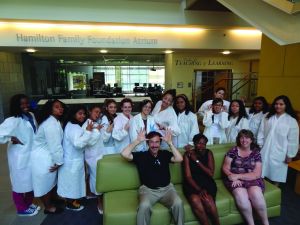When Cabrini students went home for the summer, the campus didn’t stay vacant for long. Like in previous summers, the college became home to a variety of camps.

On couch (right and left): Mother Cabrini High School administrators; (middle): Dr. Vassie Ware.
What was different this summer, however, was that for one week, the campers that came were other Cabrini students –from New York.
Mother Cabrini High School, an all-girls’ school in the Bronx, sent 15 students for a weeklong science camp.
“We gave them the whole college experience,” Dr. David Dunbar, associate professor of biology, said. “Not only did they do cutting-edge science, but they also experienced other aspects of college life.”
The girls experienced college life with RA s, TAs and trips to Philadelphia.
“They actually didn’t want to leave for home at the end of the week – they wanted to stay,” Dunbar said.
The girls’ RA s, who worked closely with Dunbar and his TAs, were senior sociology and American studies double-major Amy Rodden and junior communication major Jenay Smith.
The research that the girls conducted comes at the tail end of a three-year focus for Cabrini’s introductory honors biology course on mycobacteriophage genomics, or “phage genomics.” The girls worked with a strain of live mycobacteria, Mycobacterium smegmatis, in order to isolate and grow their phages. It is a nonpathogenic relative of Mycobacterium tuberculosis and Mycobacterium leprae, the pathogens that cause tuberculosis and leprosy.
Approximately one-third of the world’s population suffers from tuberculosis. The number of phage particles on Earth at any given time fall in the nonillions, making them one of the most common microbes on the planet.
“Our knowledge of bacteriophage may be applied to phage therapy in lieu of antibiotics later on, so the research the girls have accomplished in such a short time is extremely important,” one of the program’s TAs, junior biotechnology major DJ Moran, said in an email.
The girls retrieved their own phages from the soil around Mother Cabrini High School and were able to characterize them.
“They certainly weren’t a shy group,” junior biological sciences major Trevor Cross, the girls’ other TA, said. “I think it was all around enriching for them. I would say they definitely took a lot from meeting the guest speakers. And one of the parents said that the entire experience was a 1,000 percent success.”
In addition to the faculty panel that they arranged, Dunbar, along with Dr. Melinda Harrison of the chemistry department, scheduled guest speakers Dr. Tuajuanda Jordan, former director of the Howard Hughes Medical Institute SEA -PHAGES program, and Dr. Vassie Ware, professor of biology at Lehigh University, whose underprivileged backgrounds and professional successes resonated with the high school girls.
“This might’ve been the highlight, so far, of my professor career,” Dunbar said, “because it synthesized so many things: my passion for science, doing research, working with phage, having college students engage high school students… and many of these students might even be the first generation in their families to go to college.”
Dunbar said that the biology department is trying to scrounge up as much funding as possible to sustain the program until they can secure a long-term grant. The biology department was able to fund the camp for this year with a Phage Hunters grant awarded to them by the Cabrini Mission Foundation.
After driving the girls back to the Bronx, they along with their RA s collected more soil samples containing phage. Dunbar’s goal for the program is to eventually sequence the genome of one of the girls’ phages to learn more about its genes and to discover how unique it is.
A return trip to Mother Cabrini High School is in the works for Moran, Cross and Dunbar in order to update the girls on the results of the ongoing research being conducted on their samples. They remain connected
to the high school girls through a Facebook group called “Phagebook” and plan to keep the girls engaged with their findings at least until they graduate.
“This isn’t the end of it – this is only the beginning,” Dunbar said.


